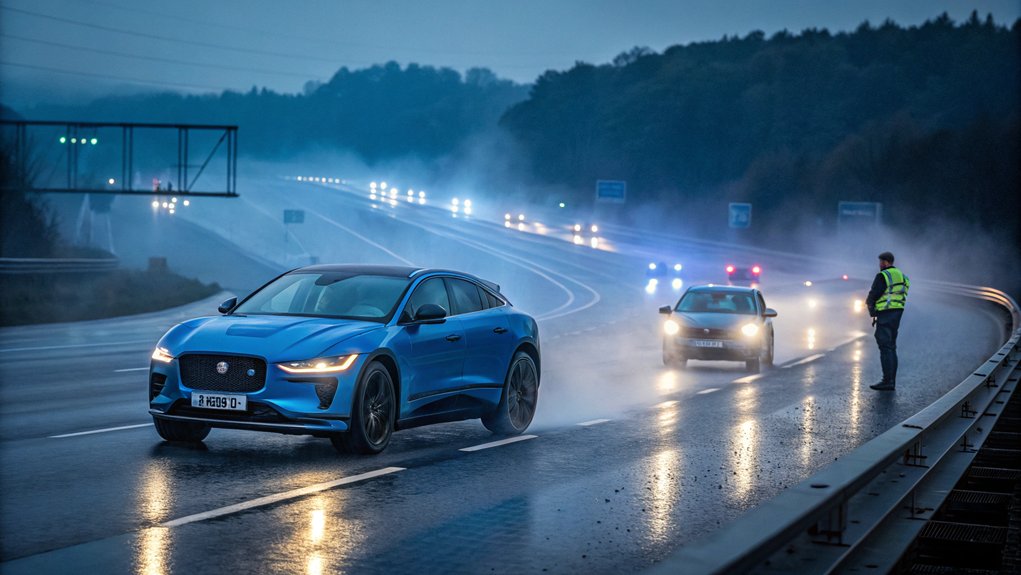Cheshire residents face soaring housing costs and vanishing services after government overhaul. Is your family's welfare at risk? Local communities struggle as policy changes reshape the county's future.
A Jaguar I-Pace driver faced a harrowing situation when their vehicle's brakes failed at nearly 100mph on the M62 motorway, requiring intervention from multiple police departments. The incident, which follows a similar failure in December 2023, has prompted Jaguar Land Rover to launch an urgent investigation into potential electronic system faults. The event has raised significant concerns about electric vehicle safety standards and highlighted the need for improved emergency response protocols for electric vehicles. This incident continues to shape discussions around EV safety measures.
When a Jaguar I-Pace driver found himself hurtling down the M62 motorway at nearly 100mph with no functional brakes, the incident sparked immediate concerns about electric vehicle safety. The situation required swift intervention from multiple police departments, including Merseyside and Greater Manchester Police, who employed specialist pursuit tactics to bring the vehicle to a safe stop.
A high-speed brake failure on the M62 required coordinated police action to rescue a Jaguar I-Pace driver from potential disaster.
This wasn't an isolated incident, as the same driver had experienced a similar brake failure in December 2023. Jaguar Land Rover (JLR) has launched an urgent investigation into these occurrences, while emphasising that safety remains their highest priority. Prior to the brake failure, the driver noticed a battery malfunction warning on his dashboard. The company is now cooperating fully with police investigations to determine the root cause of these dangerous malfunctions.
You'll find that the I-Pace, like many modern electric vehicles, relies heavily on advanced electronics for its braking system. This dependence has raised questions about the vulnerability of such systems to electrical faults, especially when compared to traditional mechanical safety features found in older vehicles.
The lack of a conventional off-switch in electric vehicles has additionally complicated emergency response procedures.
The incident has drawn attention to broader safety concerns within the electric vehicle industry. Similar issues, such as "phantom braking," have been reported in other electric vehicle brands, including Tesla. These recurring problems have led to increased scrutiny of safety standards and regulatory oversight for electric vehicles.
The Driver and Vehicle Standards Agency (DVSA) is now supporting investigations into these incidents, while JLR faces potential legal and regulatory consequences if systemic faults are identified. A driver was arrested for dangerous driving and causing a public nuisance following a related incident, highlighting the serious nature of these safety concerns.
You should know that there's growing debate about whether modern vehicles need additional backup safety systems, such as manual handbrakes, to provide emergency control options. Regular maintenance and software updates have become essential factors in preventing technical issues, though some argue these measures aren't sufficient.
The public's response to these incidents has prompted calls for a full recall of the I-Pace model. As investigations continue, drivers are being advised to stay vigilant about their vehicle's maintenance and report any unusual behaviour without delay.
The incident has become a catalyst for broader discussions about electric vehicle safety standards and the need for improved emergency response protocols in an increasingly electrified automotive environment.
Most-Asked Questions FAQ
How Often Do Electric Vehicles Experience Complete Brake System Failures?
You'll find complete brake system failures in EVs are relatively rare, though manufacturers haven't released specific statistics. Recent investigations suggest they're more common than in conventional vehicles.
What Backup Safety Systems Are Installed in Modern Electric Jaguars?
You'll find multiple backup safety systems in modern Jaguars, including emergency braking, lane-keep assist, blind spot monitoring, driver condition alerts, and an extensive surround camera system for improved control.
Can Weather Conditions Affect the Braking Performance of Electric Vehicles?
Yes, weather considerably affects your EV's braking. You'll notice reduced regenerative braking in cold temperatures, while hot weather can impact battery performance and limit your braking system's overall efficiency.
What Are the Maintenance Requirements for Electric Vehicle Braking Systems?
You'll need regular brake fluid changes, inspections every 7,500 miles, and occasional friction brake use to prevent rust. Don't forget to check for recalls and maintain both regenerative and traditional braking systems.
How Do Electric Vehicle Brake Failures Compare to Conventional Car Failures?
You'll find EV brake failures often stem from electronic systems and regenerative braking issues, while conventional cars typically face hydraulic or mechanical failures in their more traditional braking components.
